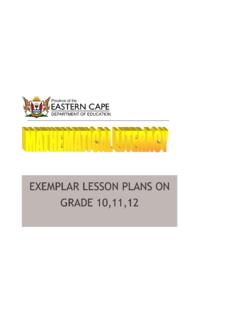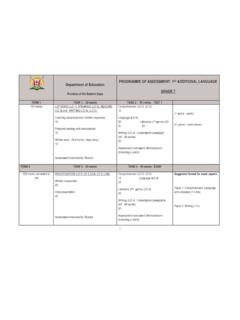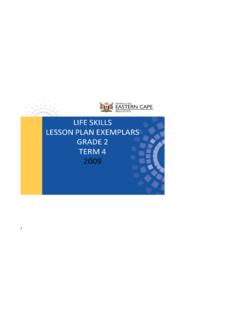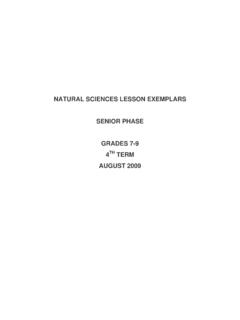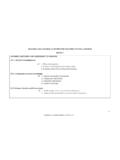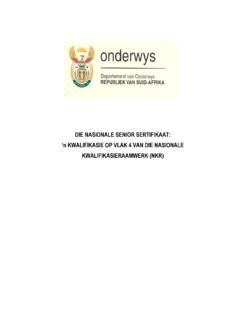Transcription of Grade 1 Baseline Assessment - eccurriculum.co.za
1 Grade 1 Baseline Assessmentliteracy, numeracy and life skills 2009 EASTERN cape DEPARTMENT OF EDUCATION gemprint 043 722 0755 [40253]CONTENTS Page FOREWORD INTRODUCTION Grade 1 Baseline Assessment Programme .. 1 SECTION A Recording sheets: Grade 1 Baseline Assessment Programme Literacy recording sheets .. 7 Numeracy recording sheets .. 11 Life Skills recording sheets .. 13 SECTION B Exemplar: Work Schedules for Grade 1 Baseline Assessment Literacy Work Schedule .. 15 Numeracy Work Schedule .. 24 Life Skills Work Schedule .. 31 SECTION C Exemplar: lesson Plans (Days 1 to 10) .. 34 RESOURCES ( Grade 1 Baseline Assessment document: Literacy, Numeracy, Life Skills September 2007, Western cape Education Department) FOREWORD This resource material is based on the 2007 Grade 1 Baseline Assessment Programme (BAP) of the Western cape Education Department (WCED). In preparation for implementation in the schools of the Province of the Eastern cape in 2010, the BAP was piloted in 46 schools in the Province of the Eastern cape in 2009 to determine the strengths and weaknesses of the programme.
2 Recommendations for adaptations received from teachers and curriculum advisors have been included in this revised Baseline Assessment Programme which is offered to schools as a resource document to strengthen teaching and learning in the early grades. Teachers should note the following: The Baseline Assessment Programme consists of daily lesson plans that include both orientation activities and Baseline Assessment activities. Not all the activities are assessed. The exemplar lesson plan is set out over 10 consecutive days. If necessary, 15 days can be used to complete the Baseline Assessment . This will accommodate contextual barriers large classes. It allows more time for opportunities for all learners to be assessed. Recording sheets have been strengthened by breaking down certain Assessment standards Assessment Standard 1 of Thinking and Reasoning. Knowledge of concepts such as quantity, size, shape, direction and colour are recorded separately.
3 The following points must be emphasised with regard to the implementation of the BAP:- 1. The purpose of Baseline Assessment is to determine what learners already know. It is all about assessing Grade 1 learners current levels of understanding, not about teaching. 2. Not all learners will have attended Grade R classes. Teachers should therefore not be discouraged if learners are unable to demonstrate the outcomes. Teachers should also not make any assumptions about the learners knowledge (stereotype/ label the learners). The NCS states: teachers need to remember that not all learners will have attended Grade R. Concepts, skills and strategies for Grade R need to be taught and consolidated in Grade 1 . This teaching happens AFTER Baseline Assessment . This is the reason why we do a Baseline : to determine the learners prior knowledge, their strengths and weaknesses. 3. Recording of learners performance: No codes are necessary as a Baseline Assessment is not intended to evaluate levels of performance.
4 It is sufficient to indicate whether learners can or cannot demonstrate the Learning Outcomes and Assessment Standards (LOs and ASs). 4. A test is not an appropriate form of Assessment for Grade 1 Baseline Assessment . 5. It is not necessary to also complete a school readiness Assessment as the Grade 1 initial BAP includes aspects of school readiness Assessment . It is based on the Learning Outcomes and Assessment Standards of the previous Grade ( Grade R). 6. Teachers should use the information obtained from the Baseline Assessment to inform their planning and to identify which learners need intervention. This intervention should start immediately. Implementation from 2010 The Eastern cape Department of Education recognises that every class and every learner is unique. We also recognise that some teachers may require more detailed activities to assess learners who enter into Grade 1. In cases where the majority of learners in a class have attended Grade R, teachers are at liberty to streamline the activities in the lesson Plans before they proceed with formal Grade 1 teaching.
5 The importance of early Assessment and identification of barriers to learning cannot be over emphasised. It is envisaged that this exemplar of initial Baseline Assessment , will go a long way towards helping teachers to determine the strengths and needs of each and every Grade 1 learner. Working from this informed basis, teachers will be in a better position to provide differentiated learning experiences to their learners. Teachers are advised to contact colleagues and District Curriculum Advisors for support where needed. _____ DR F PETERS DIRECTOR: CURRICULUM ECD & GET PROGRAMMES Introduction to EXEMPLAR lesson plan framework for initial Grade 1 Baseline Assessment : Day 1 to Day 10 INTRODUCTION Exemplar lesson plan framework for an initial Grade 1 Baseline Assessment : Day 1 to Day 10 CONTENTS Exemplar lesson Plans for Literacy, Numeracy and Life skills have been designed for 10 days as a guideline in order to lead to careful and thoughtful Baseline Assessment .
6 They have been designed from the planning reflected in the Grade 1 Literacy, Numeracy and Life Skills Work Schedules that forms part of the BAP. Together the Work Schedule and lesson Plans provide an exemplar Grade 1 teaching, learning and Assessment programme for Baseline Assessment for the first 10 days of the year. Assessment Planned Assessment is indicated with some activities. This has been included at the end of the activity. You should not teach towards this planned Assessment as this will defeat the purpose of the Baseline Assessment . Your strategy to assess all your learners against that Assessment Standard / cluster of Assessment standards will depend on what is manageable in your context with that activity: assess the whole class or select some learners only. Where only some learners are assessed the others need to be assessed on the same Learning Outcome and Assessment Standard at another time.
7 Ensure that for every activity the learners who are being assessed (all or some) know exactly what is being assessed and how. They then need your feedback (encouragement, praise, recognition of efforts, etc). Use the recording tool as a checklist to record which learners can or cannot demonstrate the required skills / do the activity. Where learners cannot demonstrate the skv s, then record this. Use this information for planning your intervention and teaching. Most Assessment standards are repeated several times throughout the 10 days. This allows for more than one opportunity to assess a learner, but only if necessary (for example, the learner was obviously upset, ill, tired, etc when the initial Assessment was conducted). This will not be necessary for the majority of learners. Repeat the assessments done with groups until all learners have been assessed. This is especially important with regard to mathematics Assessment and those incorporated into morning routines.
8 Learners work that has been used for Assessment purposes should remain at school as evidence of prior learning. 1 Introduction to EXEMPLAR lesson plan framework for initial Grade 1 Baseline Assessment : Day 1 to Day 10 ACTIVITIES Fit in your assembly, break times, snack and toilet routines, etc. where relevant for your school timetable. Work through all the activities in the first ten days of the school year. Activities are numbered. Follow the number sequence as closely as possible. Repeat and expand daily on the welcome routine until it includes all the activities described under that heading. Do all the activities from a given day, or carry them over to the next day and so on until the learners have completed all activities. You can add activities, daily outdoor physical activities. You can adapt certain aspects of the activities make changes to the sequence/ make changes to the welcome routine introduce a new chart every 2nd or 3rd day rather than every day as suggested / make changes to accommodate your resources / make changes to include your style.
9 The activities themselves, however, may not be adapted. You can merge and collapse activities but only if it does not affect the planned Assessment . Numeracy activities should be followed as suggested. You should add relevant rhymes, songs, and games to reinforce the activity, as an introduction or as a conclusion to the activity. Please ensure that no activities are omitted even if the programme takes you a little longer. The Baseline Assessment Programme may extend to 15 days, however, do not exceed 20 days. A daily story time is included. This should take place at the end of each day. You will need to prepare before the day. Choose a story related to the context theme / topics of the day so that a variety of stories and story types are covered. Free play activities should support these activities and provide further opportunity for continuous Assessment . Ensure learners take work home daily / as often as possible drawings, practice writing, etc as evidence of learning for the family / caregiver.
10 ROUTINES : Arrival/reception; assembly; tidying up; snack; break; toilet; home time Build these into your programme. Use these times as a valuable opportunity for teaching, learning and Assessment . RESOURCES Resources required for the activities are included next to the activity itself. You may prefer to list these separately so that you can see at a glance what is needed for the day or week. You can adapt and substitute suggested resources but it is recommended that you provide similar types of resources. Substituting resources is not recommended for the Numeracy activities. 2 Introduction to EXEMPLAR lesson plan framework for initial Grade 1 Baseline Assessment : Day 1 to Day 10 BARRIERS TO LEARNING This depends on your context and you will need to indicate this in the lesson plan . FEEDBACK INTO THE PROCESS Please read all the documentation carefully, make your own notes after each day in the allocated space marked Reflection.
